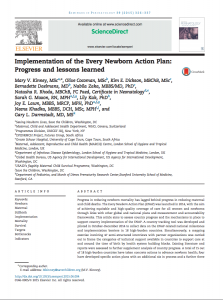
Abstract
Progress in reducing newborn mortality has lagged behind progress in reducing maternal and child deaths. The Every Newborn Action Plan (ENAP) was launched in 2014, with the aim of achieving equitable and high-quality coverage of care for all women and newborns through links with other global and national plans and measurement and accountability frameworks. This article aims to assess country progress and the mechanisms in place to support country implementation of the ENAP. A country tracking tool was developed and piloted in October–December 2014 to collect data on the ENAP-related national milestones and implementation barriers in 18 high-burden countries. Simultaneously, a mapping exercise involving 47 semi-structured interviews with partner organizations was carried out to frame the categories of technical support available in countries to support care at and around the time of birth by health system building blocks. Existing literature and reports were assessed to further supplement analysis of country progress. A total of 15 out of 18 high-burden countries have taken concrete actions to advance newborn health; four have developed specific action plans with an additional six in process and a further three strengthening newborn components within existing plans. Eight high-burden countries have a newborn mortality target, but only three have a stillbirth target. The ENAP implementation in countries is well-supported by UN agencies, particularly UNICEF and WHO, as well as multilateral and bilateral agencies, especially in health workforce training. New financial commitments from development partners and the private sector are substantial but tracking of national funding remains a challenge. For interventions with strong evidence, low levels of coverage persists and health information systems require investment and support to improve quality and quantity of data to guide and track progress. Some of the highest burden countries have established newborn health action plans and are scaling up evidence based interventions. Further progress will only be made with attention to context-specific implementation challenges, especially in areas that have been neglected to date such as quality improvement, sustained investment in training and monitoring health worker skills, support to budgeting and health financing, and strengthening of health information systems.
Learn more about Every Newborn.